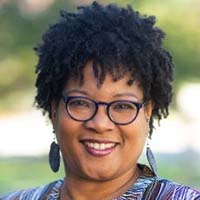
The Nelson Institute for Environmental Studies has named Monica White the Gaylord A. Nelson Distinguished Chair in Integrated Environmental Studies. This honor recognizes White’s contributions to the academy including her work to better understand the ways agriculture promotes freedom, health, and a sense of community, especially within Black communities.
“Holding this title is an honor,” said White. “I’m grateful for the acknowledgement that allows us to think about elevating and unearthing the voices of centuries of folks who have grown food in their communities. This title suggests to me that the elevation of these voices and this work has a welcome home within Nelson.”
White will hold this chair, which was established through a grassroots fundraising campaign in honor of Nelson Institute namesake, Earth Day founder, former Governor of Wisconsin, and U.S. Senator Gaylord Nelson, until June 2025.
During that time, White will continue to expand the conversation surrounding agriculture as a form of resistance and resilience and investigate its role in the current food justice and sovereignty movements.
“The Gaylord Nelson Distinguished Chair was established to advance the work of the finest environmental scholars on campus. Several of our most extraordinary faculty have held it over the years,” shared Nelson Institute Dean, Paul Robbins. “Dr. White’s contributions in the position are incredibly exciting, since they unite diverse environments with agricultural knowledge, and struggles over justice. They also reflect an ongoing evolution in campus thinking about environmental work and the many communities it does, can and should touch.”
White has been a leader in that scholarship, authoring the book, Freedom Farmers: Agricultural Resistance and the Black Freedom Movement, which combines historical analysis and first-hand accounts to expand the conversation on this topic. White received the 2019 Eduardo Bonilla-Silva Outstanding Book Award from the Society for the Study of Social Problems and the 2020 First Book Award from the Association for the Study of Food and Society for her work on this book.
White is currently working on a new book that will focus on George Paris, who was one of the first black United States Department of Agriculture loan officers. The story follows Paris and his family who did not participate in the Great Migration, but instead stayed in the south.
“My current research is on telling this family’s story, because an overwhelming amount of the scholarship on the Great Migration concentrates on families like mine that left,” said White. “But his family didn’t leave and understanding who they are and why they stayed gives us a sense of the complexity of what it means to live in rural communities and it’s an important lesson about what it means to stay.”
White will also continue teaching. This semester, she is leading that course, Issues on Food, in which students discuss the benefits and challenges of our current food system as well as how that impacts marginalized communities.
“In this class students juggle between asking themselves about their own food biographies and important questions about what food access looks like including who gets to decide the rules around food and in what ways do community-based food systems add something culturally, socially, and environmentally as a response to food access,” White said. “We also added a section on the COVID-19 crisis because I think it was transformational in the ways people thought about their relationship with food and food systems. I think that for many, we knew the fragility of the food system, but having a chance to see grocery store shelves empty at the beginning of the shutdown alerted people to what a system is and what flaws are in the current system. That helps us value folks we previously overlooked through our privilege and belief that food was always going to be there.”
In addition to teaching in the classroom, White will also continue community outreach, helping to lead conversations about diversity, food systems, and more beyond the campus community.
“During my time as chair, I hope we will grow in terms of expanding the conversation around food access and food accessibility,” White said. “I’m hoping we can be more inclusive and that we will ask ourselves about who is missing from the table when we respond to these food, environment, and community concerns and how might we find ways to bridge these gaps and engage each other in a respectful, compassionate ways that identify solutions that are embraced.”